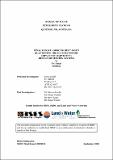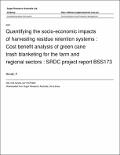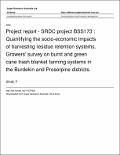Quantifying the socio-economic impacts of harvesting residue retention systems : SRDC Final report BSS173
| Author | Small, FG |
| Date Accessioned | 2012-11-14 |
| Date Available | 2012-11-14 |
| Issued | 2002 |
| Identifier | http://hdl.handle.net/11079/976 |
| Abstract | BSS173: 'Quantifying the socio-economic impacts of harvesting residue retention systems' is a project jointly funded by the Sugar Research and Development Corporation and Land and Water Australia (formally Land and Water Resources Research and Development Corporation) from 1996 to 2002.The project was initially established after concerns that regulations on burning cane overseas would be introduced in Australia, and the socio-economic implications would not be known. There are a number of issues associated with burning of cane both before and after harvest. These include health concerns, pollution, nuisance and cleaning issues.The effect of the imposition of burning restrictions on growers was also a major concern, particularly with respect to furrow irrigation. Field trials were carried out in the Proserpine district to determine the effect of trash on furrow irrigation and to develop management methods to overcome any difficulties. These trials were used in conjunction with APSIM, an agricultural production simulator, and SIRMOD, a surface irrigation model, to determine optimal furrow irrigation under a number of situations. |
| Language | en |
| Part of Series | BSES Internal Report; 2002 No 1108 Report SD01012; SRDC BSS173 |
| Subject | Environmental impact |
| Subject | Harvesting Green Cane Burnt Cane |
| Subject | Crop management |
| Subject | Trash management |
| Subject | Furrow irrigation |
| Subject | APSIM |
| Subject | SIRMOD |
| Subject | Green cane trash blanketing (GCTB) |
| Subject | Community perception |
| Subject | Survey |
| Subject | Industry perception |
| Subject | Economic impact |
| Subject | Farming systems |
| Subject | Production management |
| Title | Quantifying the socio-economic impacts of harvesting residue retention systems : SRDC Final report BSS173 |
Files in this item
This item appears in the following Collection(s)
-
Farming systems and production management [226]
Research outcomes: Growers and harvesters benefit from the ongoing research in productivity improvement, production management and agronomical techniques. Developed technologies and management practices that enhance productivity and demonstrate a high rate of return on investment



